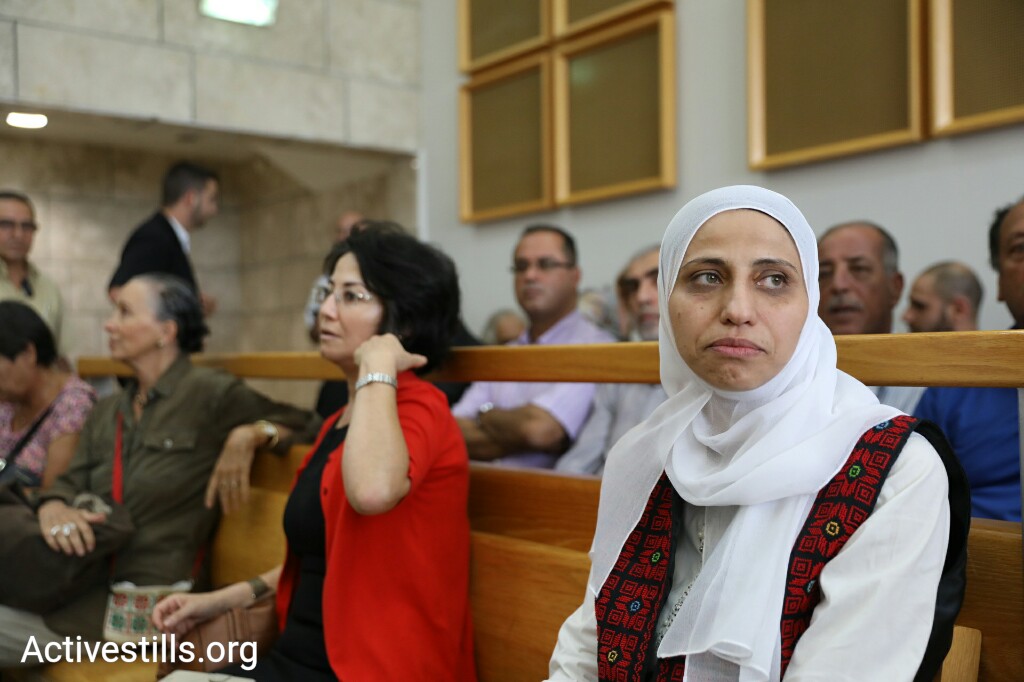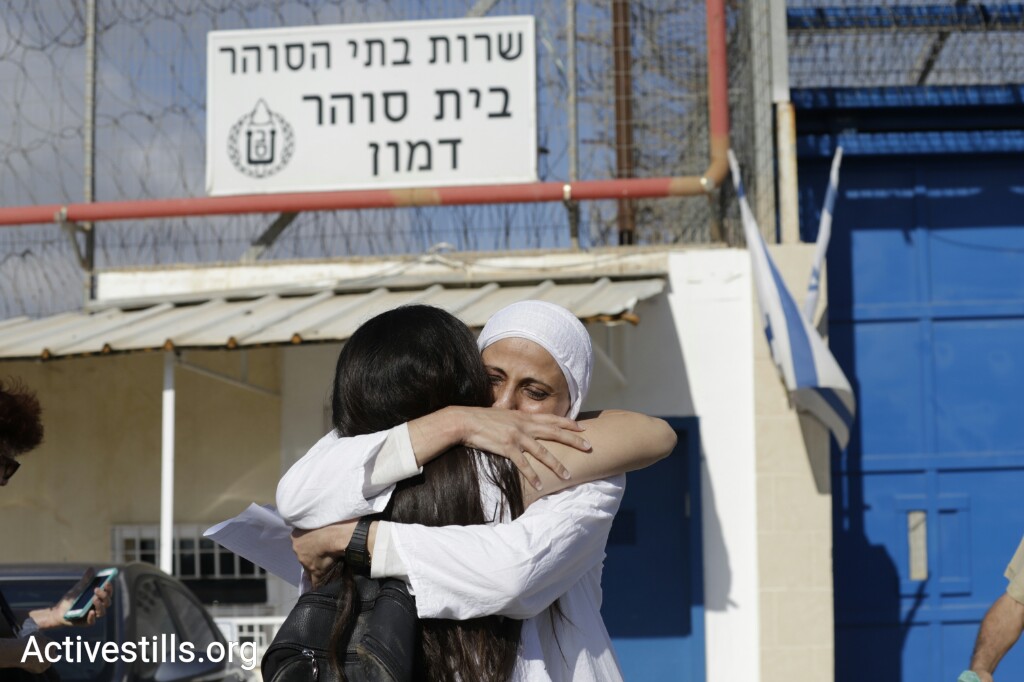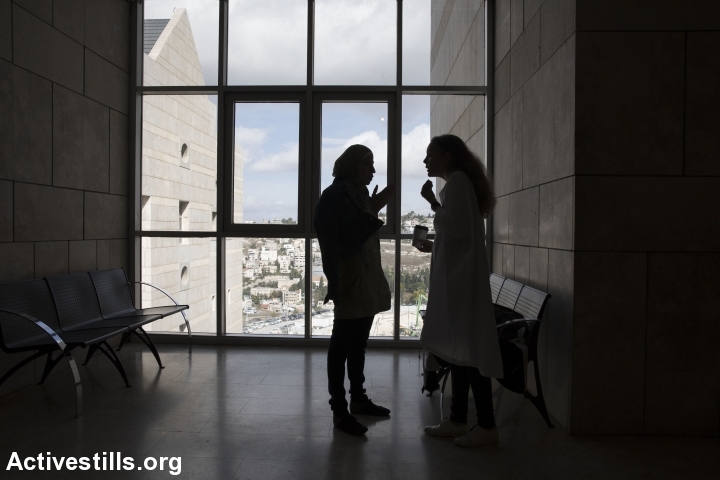Dareen Tatour was convicted of incitement to violence and support for terrorism in her poetry. Rescinding the charges won’t exonerate her completely, but it would allow her to continue writing.
By Yoav Haifawi

In ordinary trials, after a defendant has finished serving their sentence, one can safely assume that the legal drama is over. There is nothing ordinary, however, about the trial of Palestinian poet Dareen Tatour.
Tatour was released on Sept. 20 from a five-month prison sentence, after she had already spent two-and-a-half years under house arrest. The Nazareth District Court convened on Dec. 25 to hear an appeal against her conviction for incitement to violence and support for a terrorist organization over a poem she published on YouTube and Facebook.
Tatour, 36, who hails from the village of Reineh near Nazareth, was convicted in May, nearly three years after she was first arrested for publishing her poetry on social media. She was first arrested on Oct. 11, 2015 after publishing a number of poems on her Facebook page, including “Qawem Ya Sha’abi, Qawemhum” (“Resist my people, resist them”).
That poem was published in 2015 (read an English translation here), at the height of mass Palestinian protests across Israel and the West Bank against restrictions on Muslim worshippers’ access to the Aqsa Mosque, and during a wave of so-called lone-wolf attacks against Israeli security forces and civilians, largely in Jerusalem and Hebron. A few days after Tatour posted the poem on Facebook, police stormed her house and arrested her in the middle of the night.
Despite her newfound freedom, Israeli authorities seem intent on attacking her. Just earlier this week, Culture Minister Miri Regev demanded that the Finance Ministry refrain from funding a new exhibition in Jerusalem because it includes the poem which landed Tatour in prison.

Gaby Lasky, Tatour’s attorney, spared no effort in trying to prove that the accusations against Tatour are unfounded, followed by a rebuttal from State Attorney Avital Sharoni. The panel included three judges from the District Court, headed by Judge Ester Hellman.
Judge Yifat Shitrit studied the case in advance and led the discussion throughout the hearing. Already at the beginning of the hearing, Shitrit clarified that the court intends to hold fast to the standard of criminal law according to which “if there is doubt — there is no doubt.” That is, if Tatour’s words could be interpreted differently than what the indictment attributed to her, she should be acquitted.
Lasky tried to focus her arguments on the importance of freedom of political and artistic expression, which are not only the rights of the individual but also form the soul of democracy and are vital to society. The judges tried to point her in a different direction, asking her to define when, exactly, a poem might cross the boundaries of criminal law.
After lengthy negotiations, Lasky declared that, according to both her belief as well as the expert opinion of defense witness Professor Nissim Calderon, the state should not apply criminal law to poetry. Lasky admitted that law itself does not provide protection for poetry, but it lays out definitions for illegal expression, including “direct calls to violent action” or a “real possibility” that a violent act might be carried out as a result. Lasky made clear that Tatour did not publish any call for violent action and the prosecution did not present even a shred of evidence that her poems may have inspired violence.
Finally, Lasky mentioned that she knew of only one previous case in Israel in which a poet was accused of incitement for a poem he wrote. In the early 1990s, poet Shafiq Habib from the village of Deir Hanna dedicated his poems to the “children of the stones,” referring to children who hurled stones at Israeli security forces during the First Intifada. Habib was initially convicted in the Acre Magistrate’s Court but his appeal was accepted and he was acquitted.
Throughout the course of the hearing, the judges tried to examine the poem’s underlying meaning, especially the line “follow the caravan of martyrs,” which Judge Adi Bambiliya-Einstein interpreted as a call for suicide attacks. Their comments demonstrated the prevailing misconception among the Jewish public over the word “shahid,” which is often misinterpreted as “suicide bomber.”
That’s when the third judge, Sa’eb Dabour, explained that the word refers to people who died under various circumstances, including innocent victims of the Israeli-Palestinian conflict. After the dispute was settled, the judges again discussed the context of the line within the poem. They recognized that the martyrs mentioned in the poem, such as Hadil Al-Hashlamoun and baby Ali Dawabsheh, were victims of the occupation.
At one point, the judges requested to watch the video Tatour uploaded to Facebook featuring the poem, which was submitted to the court as part of the evidence. Upon viewing the video, the judges seemed to have changed their minds again. Throughout the trial, the prosecution argued that the video shows violent activity, affecting the meaning of the poem, as does the dramatic music in the background. The District Court judges agreed that the music increases the effect of the poem and the video.
Lasky insisted that the video presents the daily reality of violent clashes between the Israeli army and Palestinians under the military occupation, and that it is this reality that forms the background to the poem’s writing. The poet’s statement, Lasky said, should be found in the words of the poem itself.
The prosecutor repeated the claim that the video showed “stone throwing and Molotov cocktails.” Lasky corrected her, stating that there are no Molotov cocktails in the video, and that the violence shown is similar to what we all regularly see in the news. Lasky mentioned that, while the Palestinian youth are seen in the video throwing stones, the soldiers are seen shooting at them. “Who is more violent?” she asked.

After a long discussion, it seemed that the judges were ready to accept the possibility that the video itself does not necessarily constitute a statement by the poet.
The judges then hinted to both sides that they should reach an agreement so that the charge against the poem would be rescinded, while Tatour’s other convictions, related to non-poetry Facebook statuses, would remain in place.
An agreement would ostensibly erase the blemish on the State of Israel and its judicial system for imprisoning a poet, yet the poet herself would not be exonerated. The judges explained that reaching a compromise is in Tatour’s interest, since she wants to continue to write poems. Stipulating that the poem itself was not a criminal act would be a blow to all those who want to threaten artistic expression in Israel.
The judges will wait for the parties’ response to the proposal for compromise. If a compromise is not accepted, they will announce a later date for a decision on the appeal.
Yoav Haifawi covered the Dareen Tatour trial and more on his blog, Free Haifa.
